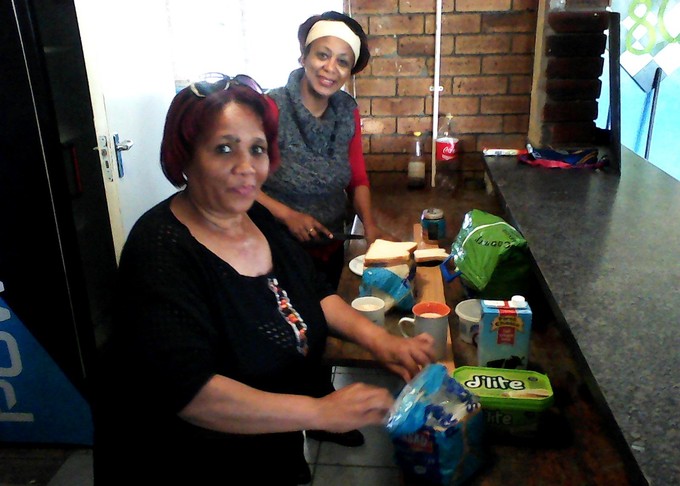Women in Ruyterwacht help evicted and vulnerable
“This is a new South Africa, a South Africa for everybody, a South Africa of change, a South Africa to uplift our people. So what is happening here?”
A group of women in the Cape Town area of Ruyterwacht near Epping and Goodwood are working actively to make their community a better place to live. Community Upliftment Projects (CUP) is a network of smaller groups that, according to its website, seeks to “identify areas of concern and needs” in the area of Ruyterwacht and to address them.
“Myself and my team represent the vulnerable in the community, which includes evicted persons, the elderly, and anybody who finds themselves in a situation which makes them vulnerable,” says Moerida Morat.
The organisation began around five years ago operating out of multiple homes until, in January, it moved into a small brick building in a sports complex in Ruyterwacht, says Aletta Lottering, the treasurer of CUP. Today marks three-years since the organisation registered with the government as an NPO.
Lottering says CUP organises meals — soup and a sandwich — once a week at a local hospital and for a group of two dozen children living in poverty in the area. It regularly provides meals for the homeless, some of whom are homeless because they were evicted. It also operates a support group for vulnerable women.
Morat says one of the main objectives of CUP is to address the shortage of affordable housing in Ruyterwacht. Lottering says since she moved to Ruyterwacht in 1996, residents of the area have been facing evictions. In recent years a non-profit organisation called Communicare took ownership of many houses and increased rents, evicting those who couldn’t pay.
“Often five or ten people a day,” she says. “It’s just heartbreaking … Structures need to be put in place because there are people involved.”
In email correspondence with GroundUp in November of last year, Raymond Schuller, a representative from Communicare, wrote that the responsibility “rests with the tenant to find alternative suitable accommodation”. However, there was the possibility of a rental subsidy from Communicare itself.
Morat says CUP wrote to the City to appeal for help regarding the evictions, but the City wrote back expressing regrets that there was nothing it could do.
“Unfortunately, it is not within this department’s ambit of responsibility to intervene,” she says, reading from the City’s email response of March 2014.
Morat says that didn’t stop CUP from trying alternative solutions.
“We decided to approach the government again and asked if they cannot see that we get some sort of government services put in place here, because there was no government service at this point in time in Ruyterwacht,” she says.
“We asked the government to assist us in a housing project for low-cost government housing, and that’s what we’ve been working on. We’ve had a few meetings regarding the new proposed housing project.”
Lottering said the evictions indicated a need for a change in policy.
“This a new South Africa, a South Africa for everybody, a South Africa of change, a South Africa to uplift our people. So what is happening here?” asks Lottering.
One resident of Ruyterwacht, who prefered to be unnamed, says he lost his government job when he suffered an accident on the job that left him unable to work. Now, CUP offers him and other residents support.
“Communicare is very expensive. They take all your [rent money], and then you have nothing… A lot of people were thrown out of their houses because of Communicare, and they just do what they like,” he says.
“The people who’ve lived here all these years — it’s hard to see them [evicted],” he says.
Support independent journalism
Donate using Payfast

Don't miss out on the latest news
We respect your privacy, and promise we won't spam you.
Next: Court strikes down Home Affairs directive on asylum seekers and refugees
Previous: District Six: 3,000 ex-residents on land claims waiting list
© 2016 GroundUp. 
This article is licensed under a Creative Commons Attribution-NoDerivatives 4.0 International License.
You may republish this article, so long as you credit the authors and GroundUp, and do not change the text. Please include a link back to the original article.

